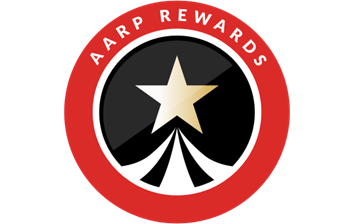AARP Eye Center
- AARP Online Community
- Games
- Games Talk
- SongTheme
- Games Tips
- Leave a Game Tip
- Ask for a Game Tip
- AARP Rewards
- AARP Rewards Connect
- Earn Activities
- Redemption
- AARP Rewards Tips
- Ask for a Rewards Tip
- Leave a Rewards Tip
- Caregiving
- Caregiving
- Grief & Loss
- Caregiving Tips
- Ask for a Caregiving Tip
- Leave a Caregiving Tip
- Help
- Membership
- Benefits & Discounts
- General Help
- Entertainment Forums
- Rock N' Roll
- Let's Play Bingo!
- Leisure & Lifestyle
- Health Forums
- Brain Health
- Conditions & Treatments
- Healthy Living
- Medicare & Insurance
- Health Tips
- Ask for a Health Tip
- Leave a Health Tip
- Home & Family Forums
- Friends & Family
- Introduce Yourself
- Housing
- Late Life Divorce
- Our Front Porch
- Money Forums
- Budget & Savings
- Scams & Fraud
- Retirement Forum
- Retirement
- Social Security
- Technology Forums
- Computer Questions & Tips
- About Our Community
- Travel Forums
- Destinations
- Work & Jobs
- Work & Jobs
- AARP Online Community
- Money Forums
- Budget & Savings
- Re: Ask The Expert: Keeping Debt Manageable During...
Ask The Expert: Keeping Debt Manageable During Challenging Times
- Subscribe to RSS Feed
- Mark Topic as New
- Mark Topic as Read
- Float this Topic for Current User
- Bookmark
- Subscribe
- Printer Friendly Page
- Mark as New
- Bookmark
- Subscribe
- Mute
- Subscribe to RSS Feed
- Permalink
- Report
Ask The Expert: Keeping Debt Manageable During Challenging Times
Has your debt increased during the pandemic? Is debt overwhelming part of your life? From now until March 22, our money expert Martin Booker (@MartinBooker) will share with the Online Community tips, tricks and tools for approaching overwhelming amounts of debt, creating a debt-reduction strategy, and best practices to stay consistent while effectively managing and reducing your debt.
We hope you'll join us! To participate, please post a question below.
- Mark as New
- Bookmark
- Subscribe
- Mute
- Subscribe to RSS Feed
- Permalink
- Report
@MartinBooker, thank you once again for providing your expertise in the Online Community. And many thanks to all our viewers and participants--we hope you'll join us again!
As the session comes to a close, I wonder if you might address a question that we often hear from members. When a person has been working on debt reduction, when will they know it's a good time to begin focusing on savings? Perhaps, in tandem with continued debt reduction. In other words, how do you strike the right balance between saving and debt reduction?
- Mark as New
- Bookmark
- Subscribe
- Mute
- Subscribe to RSS Feed
- Permalink
- Report
This is an excellent question, @AARPLynne! There are many factors that a person should consider when they have to find the balance between prioritizing debt reduction and savings. In most cases we are told to pay off our debt first and then begin building your savings. This is not a bad strategy but we must keep a few things in mind, such as:
- Your safety net: Will you be able to focus solely on paying debt? Are you in the position to delay savings while focusing on lowering debt? If you do not have a backup plan for managing your day-to-day expenses if you stopped earning income, then savings is an important priority for you.
- You have a specific savings goal to meet: If you have debt to pay down, but know that you have to save for a specific occasion or upcoming car repair, do not hesitate to slow down your aggressive debt reduction to take care of your other important obligations.
- When the debt obligation is extremely high: In this case, you may be paying debt for an extended period of time and it may be necessary to pause your aggressive debt reduction to save for emergencies. As you know, savings is a great way to keep from falling further into debt. Student loans can be one of those times when your debt obligation is extremely high, so pausing to save for emergencies is necessary. Take a look at the Savi Student Loan Repayment Tool which will help you with student loan debt www.aarp.org/studentloans
It’s important to reduce debt, but be sure to keep your lifestyle and needs as factors in the process. If you need to save because there wouldn’t be a safety net for you otherwise, then do so. Also, when you need to save for a critical expense, then slow down your debt reduction to do so. While debt reduction is a high priority, just make sure that you’ve considered all factors for your specific situation.
- Mark as New
- Bookmark
- Subscribe
- Mute
- Subscribe to RSS Feed
- Permalink
- Report
- Mark as New
- Bookmark
- Subscribe
- Mute
- Subscribe to RSS Feed
- Permalink
- Report
Hello @margiepass ,
Thank you for this question. An emergency fund is a very important step in the money management process. It can be really tough to build an emergency fund and paydown debt at the same time. After creating your budget and having awareness of how much margin (what's left after of your income after paying all expenses), it's a good idea to focus on debt pay down or building your emergency fund. While doing so, here are a few things to consider:
- If you choose to pay down debt. Keep a small amount of reserves ($1,000-$2,000) so that you can cover any emergencies that will arise.
- Paying down debt and saving at the same time can seem counterintuitive, because your debt interest rates are growing faster than your savings interest rates. So each month you're accumulating more debt than savings interest.
- Try to forecast your expenses and save for them. If you know that you have a few medical appointments coming up and there is a chance that you will have a balance to pay, factor that payment into your budget and add that money to savings. Also, things like car repairs can be saved month to month, little by little, before you have to make the repair. This way, you won't have a surprise bill all at once.
Be sure to checkout the AARP Money Map, which has a solution for you that focuses on how to handle unplanned expenses. You can go to www.aarp.org/moneymap for more information on this free online tool.
- Mark as New
- Bookmark
- Subscribe
- Mute
- Subscribe to RSS Feed
- Permalink
- Report
- Mark as New
- Bookmark
- Subscribe
- Mute
- Subscribe to RSS Feed
- Permalink
- Report
Hello @julieanntabb ,
Thank you for your question. Paying down debt will be really fulfilling as it is reducing. As we know, credit card debt can be tough because of the high interest rates. While in retirement, here are a few things to consider when paying off debt:
- Start off with a budget so that you have a clear sense of how much money you have available to pay towards debt. Your budget will help you to clearly see your income, expenses and the difference. This way, you will be able know how much you can add towards debt above the minimum monthly payments. Also, use the budget as an opportunity to look at your expenses and find places to possibly cut expenses.
- Additional income that is made solely for paying off debt can be helpful. If you need more money to speed up your debt reduction process, consider a work-from-home, gig or part time job to do so. You can also consider selling unused items in order to make money for additional debt payments. When selling items online or looking for work-from-home opportunities, be sure to keep an eye out for scams.
- Organize your debt, using a debt tracker so that you can see minimum payments, Interest rates, due dates and balances. Having these items in a tool, can help you to stay on track with your debt reduction. Checkout the AARP Money Map as a resource to track your debt reduction www.aarp.org/moneymap
Good luck on your debt pay down journey. It may seem long and a bit daunting, but very rewarding.
- Mark as New
- Bookmark
- Subscribe
- Mute
- Subscribe to RSS Feed
- Permalink
- Report
CC debt is the WORST because the interest rates are so high. The common corresponding problem is one becomes almost reliant on living on these credit lines as payment increasing consume one's income.
I would recommend a credit counselor endorsed by your local AARP or your United Way for professional guidance. Given your resources, debts they can make relevant recommendations.
Going forward you'll need to subscribe to Dave Ramsey, ie get and stay out of debt, build a safety net of savings, etc.
- Mark as New
- Bookmark
- Subscribe
- Mute
- Subscribe to RSS Feed
- Permalink
- Report
@Gorm50 this is great advice. Talking to financial professionals that have worked with someone in your financial situation is always great value. Inside of the AARP Money Map, there is a reference to credit counselors and other resources that can be helpful.
- Mark as New
- Bookmark
- Subscribe
- Mute
- Subscribe to RSS Feed
- Permalink
- Report
There will be times when debt has become high and the only plan is to manage debt successfully until we’re able to find the means to truly tackle debt reduction. Here are some things to consider during times like these:
- Keep up with the minimum payments- In order to keep your credit score intact, paying on time will help you significantly
- Avoid extra charges- making those on time payments of the monthly minimums, you will avoid late charges which adds to your debt. Late fees, plus interests can lead to accumulating balances on your credit cards. While interest, will continue to accumulate until your debt is paid off, late fees are avoidable.
- Call your debt collector and request a lower interest rate- Interest accumulation on your debt will increase the loan balance. So it’s worth a shot to call your credit card company and simply ask “Is it possible that you can lower my interest rate on this credit card?” While it’s not in the best interest of the credit card company, they may want to keep you as a customer and accommodate your request.
- Pay just the minimum until you’re comfortably able to do more- Often times we have the desire to lower our loan debt, so we pay above the minimum at the expense of other priorities. When needed, just simply keep your debt paid on time and fulfill the minimum obligation and during times of windfalls, reduction of other expenses or if you decide to work for additional income, then you can make larger payments towards lowering the principle. With this method, all priorities are filled, and when extra money is available, then you can focus your attention on debt reduction.
- Mark as New
- Bookmark
- Subscribe
- Mute
- Subscribe to RSS Feed
- Permalink
- Report
There will be times when debt has become high and the only plan is to manage debt successfully until we’re able to find the means to truly tackle debt reduction. Here are some instances when this must be done:
- There isn’t enough margin to make additional payments which is a time when you just want to maintain your minimum payments in order to keep your credit in order. Other opportunities will come to make a windfall payment (with tax money or an inheritance) or to make payments when other bills are lowered.
- When there is uncertainty about your future income like right now when job loss is high and there is not full clarity about the future of the economy or jobs. Times like theses, saving and keeping your money accessible is very advantageous
- When there are competing priorities, such as other bills that need to be paid. At minimum, makes sure that all obligations are covered so that nothing falls behind. Continue to maintain all expenses until an opportunity comes to make larger payments towards debt. This could be a time to start some gig work or work a part time job until you meet your debt reduction goals
While debt reduction can seem like it’s a pressing issues, there will be moments when you have to maintain your debt instead of focusing on debt reduction until you’re able to do so successfully. Take into consideration of your options to transition from debt management to debt reduction.
"I downloaded AARP Perks to assist in staying connected and never missing out on a discount!" -LeeshaD341679



































































